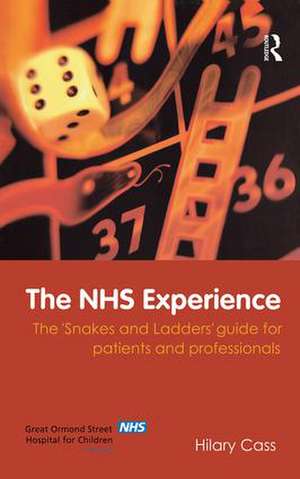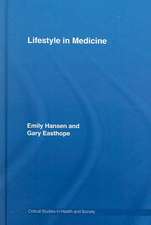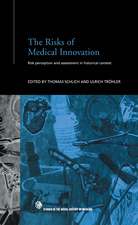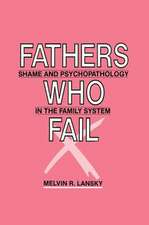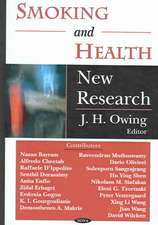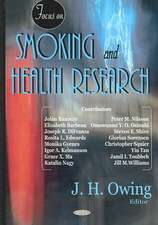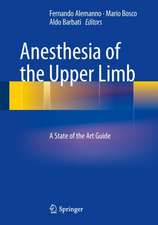The NHS Experience: The 'Snakes and Ladders' Guide for Patients and Professionals
Autor Hilary Cassen Limba Engleză Hardback – 27 feb 2017
Based on the successful Snakes and Ladders drama programme developed at Great Ormond Street Hospital, this unique book uses the story of Daniel, a fictional child with the life-limiting disease cystic fibrosis, to provide insight into the enormous challenges faced by patients, their families and the professionals involved in their care.
Asking difficult questions about how we can improve the NHS experience for everyone at the front line, Daniel’s story builds on information from a wealth of sources to highlight:
- the practical, ethical, resource and financial dilemmas integral to the NHS
- the vital issues around communication, trust, management of clinical errors, consent, shared decision-making and bereavement
- the realities of fragmented care, bed shortages, uncertain diagnoses, and complex and difficult treatment choices.
| Toate formatele și edițiile | Preț | Express |
|---|---|---|
| Paperback (1) | 243.32 lei 43-57 zile | |
| Taylor & Francis – 6 dec 2005 | 243.32 lei 43-57 zile | |
| Hardback (1) | 1000.27 lei 43-57 zile | |
| Taylor & Francis – 27 feb 2017 | 1000.27 lei 43-57 zile |
Preț: 1000.27 lei
Preț vechi: 1219.84 lei
-18% Nou
Puncte Express: 1500
Preț estimativ în valută:
191.40€ • 200.37$ • 158.37£
191.40€ • 200.37$ • 158.37£
Carte tipărită la comandă
Livrare economică 07-21 aprilie
Preluare comenzi: 021 569.72.76
Specificații
ISBN-13: 9781138178809
ISBN-10: 1138178802
Pagini: 304
Ilustrații: 6
Dimensiuni: 138 x 216 x 18 mm
Greutate: 0.45 kg
Ediția:1
Editura: Taylor & Francis
Colecția Routledge
Locul publicării:Oxford, United Kingdom
ISBN-10: 1138178802
Pagini: 304
Ilustrații: 6
Dimensiuni: 138 x 216 x 18 mm
Greutate: 0.45 kg
Ediția:1
Editura: Taylor & Francis
Colecția Routledge
Locul publicării:Oxford, United Kingdom
Public țintă
Postgraduate and ProfessionalCuprins
1. Beginnings 2. It’s Not What You Say: The diagnosis 3. Home and Away: Sharing Care 4. No Room at the Inn 5. Sorry Seems to be the Hardest Word 6. Testing Times 7. Hard Graft: Transplant Decisions 8. Endings
Recenzii
‘A relevant and compelling book, accessible to professionals and laypeople alike…an invaluable and excellent guide to using the NHS.’ - Leyla Sanai, The Lancet
‘This book is one of the most stunning I have come across in many years. The author has captured very well indeed the complexities, nuances and sometimes arcane nature of interactions in our National Health Service. The style is such that all of us can learn from the scenarios and events she describes.’ - Peter Hill, Postgraduate Dean and Director, the Northern Deanery
‘This book illustrates the patients' journey as it really is - but it also offers positive messages about mediating difference; about enabling and encouraging families and young people facing difficult decisions and about the reality (and successes) of joint working. It should be read by practitioners, professionals and managers - and by families and their support groups.’ - Philippa Russell, Disability Rights Commissioner, Disability Policy Adviser, National Children’s Bureau
'Hilary Cass has written a remarkable book to show, not tell, how and why patient-centred care is so important - and so hard to achieve...[This book] should be required reading for Foundation Programme trainees, and would make a splendid gift for young people considering a career in medicine.' - Elisabeth Paice, London Deanery
'An all round interesting read...it gives insight into how small changes to our own communication skills can make major improvements to the management of patients under our care.' - Archives of Disease in Childhood
This book is one of the most stunning I have come across in many years. The content concerns the most heart-rending matters, with its central theme of the life and care of children with chronic, severe or terminal illness, and the impact of parents, carers and others.
The author has captured very well indeed the complexities, nuances and sometimes arcane nature of interactions in our National Health Service. The style is such that all of us can learn from the scenarios and events she describes.
Professor Peter Hill
FRCGP; FFPH; FRCP
Postgraduate Dean and Director, the Northern Deanery
Member, General Medical Council Education Committee
Appointed Member of the Postgraduate Medical Education and Training Board (PMETB)
Past Chairman of the UK Conference of Postgraduate Medical Deans (COPMeD)
Lead Dean for Paediatrics
The NHS Experience - the Snakes and Ladders Guide for Patients and Professionals is an invaluable contribution to the current debate around the delivery of the National Service Framework for Children,Young People and Maternity Services and the recognition that the NHS has a particularly challenging (and long-term) role on the 'patient's journey' from childhood to adult life when that child has a disability or chronic health condition. Standard 8 of the NSF aspires to social inclusion and an 'ordinary life' for families with a disabled child. But as Professor Al Aynsley-Green, introducing the NSF, has noted, 'the practical challenge facing all of us is how to ensure that children's services locally are coherent in design and delivery, with good coordination and effective joint working, smooth transitions and partnership with children and young people and families'.
The practical challenge can be very real. As the Snakes and Ladders Guide eloquently describes, families (and professionals) go through multiple negotiations and transitions in achieving positive outcomes for children with complex needs. Decisions about treatment options will be affected by changing family perspectives and circumstances. Professionals have to energise colleagues, manage budgets and sometimes face difficult challenges in dispute management when parents disagree and there are genuine uncertainties about the future. This book illustrates the patients' journey as it really is - but it also offers positive messages about mediating difference; about enabling and encouraging families and young people facing difficult decisions and about the reality (and successes) of joint working. It should be read by practitioners, professionals and managers - and by families and their support groups.
We all aspire to common goals - but we need a reminder that the journey we make to reach them will be a 'Pilgrim's Progress', with difficult decisions and relationships as we all work towards positive outcomes for all children.
Philippa Russell
Disability Rights Commissioner,
Disability Policy Adviser,
National Children’s Bureau
‘Patients, their families, and health professionals all know the potential for problems when dealing with severe chronic illness. Yet many of the pitfalls are not an inevitable result of immovable barriers, such as limited resources, but are stumbling blocks that arise from causes such as poor communication, which are amenable to change. Hilary Cass asks how to ensure the best outcome for all concerned when using the UK’s National Health Service (NHS).
Such an ambitious remit could have produced a vast tome stuffed with dry facts, pedantic recommendations, and patronising platitudes, such as those the government seems so keen on—empowering patients, patients’ choice, and the like. But Cass, Deputy Medical Director at Great Ormond Street Hospital for Children (GOSH), London, UK, has written a relevant and compelling book, accessible to professionals and laypeople alike.
Scenarios from a fictional case history are used throughout the book to illustrate the realities of coping with a child who has a life-threatening disorder. Cass’s dramatisation of this family’s journey through the NHS is based on enactments by actors at GOSH as part of a teaching exercise. The vignettes are believable, absorbing, sensitively written, and skilfully weave in topics that are discussed after each scenario. Issues covered include communication between doctors and patients; the importance good liaison between primary and secondary care and of team working; the specific problems faced by each cog in the complex wheel of the NHS; informed consent; medical negligence; medical paternalism; randomised controlled trials; uncertainties in unlicensed treatments; and many more topics. The practical and helpful tips are clarified in easily absorbable tabular form.
My only minor source of disquiet was one that may sound curmudgeonly to professionals, but which most patients will identify with. Despite the hitches that occur in the story, all the professionals involved are altruistic, and care deeply about their patients. This may be the case in paediatrics, but as an adult with a chronic illness who has been admitted to hospital many times, it is my experience that although most staff are competent and kind, a tiny minority really would prefer to sit with their feet up at the nursing station gorging on chocolates and discussing their weekend than undertake what they see as mundane tasks, such as making post-op patients comfortable or feeding the debilitated elderly. Dealing with disinterested staff who perhaps should not be in a caring profession is the only omission from this fine book, which is an invaluable and excellent guide to using the NHS.’
Leyla Sanai, The Lancet
‘This book is one of the most stunning I have come across in many years. The author has captured very well indeed the complexities, nuances and sometimes arcane nature of interactions in our National Health Service. The style is such that all of us can learn from the scenarios and events she describes.’ - Peter Hill, Postgraduate Dean and Director, the Northern Deanery
‘This book illustrates the patients' journey as it really is - but it also offers positive messages about mediating difference; about enabling and encouraging families and young people facing difficult decisions and about the reality (and successes) of joint working. It should be read by practitioners, professionals and managers - and by families and their support groups.’ - Philippa Russell, Disability Rights Commissioner, Disability Policy Adviser, National Children’s Bureau
'Hilary Cass has written a remarkable book to show, not tell, how and why patient-centred care is so important - and so hard to achieve...[This book] should be required reading for Foundation Programme trainees, and would make a splendid gift for young people considering a career in medicine.' - Elisabeth Paice, London Deanery
'An all round interesting read...it gives insight into how small changes to our own communication skills can make major improvements to the management of patients under our care.' - Archives of Disease in Childhood
This book is one of the most stunning I have come across in many years. The content concerns the most heart-rending matters, with its central theme of the life and care of children with chronic, severe or terminal illness, and the impact of parents, carers and others.
The author has captured very well indeed the complexities, nuances and sometimes arcane nature of interactions in our National Health Service. The style is such that all of us can learn from the scenarios and events she describes.
Professor Peter Hill
FRCGP; FFPH; FRCP
Postgraduate Dean and Director, the Northern Deanery
Member, General Medical Council Education Committee
Appointed Member of the Postgraduate Medical Education and Training Board (PMETB)
Past Chairman of the UK Conference of Postgraduate Medical Deans (COPMeD)
Lead Dean for Paediatrics
The NHS Experience - the Snakes and Ladders Guide for Patients and Professionals is an invaluable contribution to the current debate around the delivery of the National Service Framework for Children,Young People and Maternity Services and the recognition that the NHS has a particularly challenging (and long-term) role on the 'patient's journey' from childhood to adult life when that child has a disability or chronic health condition. Standard 8 of the NSF aspires to social inclusion and an 'ordinary life' for families with a disabled child. But as Professor Al Aynsley-Green, introducing the NSF, has noted, 'the practical challenge facing all of us is how to ensure that children's services locally are coherent in design and delivery, with good coordination and effective joint working, smooth transitions and partnership with children and young people and families'.
The practical challenge can be very real. As the Snakes and Ladders Guide eloquently describes, families (and professionals) go through multiple negotiations and transitions in achieving positive outcomes for children with complex needs. Decisions about treatment options will be affected by changing family perspectives and circumstances. Professionals have to energise colleagues, manage budgets and sometimes face difficult challenges in dispute management when parents disagree and there are genuine uncertainties about the future. This book illustrates the patients' journey as it really is - but it also offers positive messages about mediating difference; about enabling and encouraging families and young people facing difficult decisions and about the reality (and successes) of joint working. It should be read by practitioners, professionals and managers - and by families and their support groups.
We all aspire to common goals - but we need a reminder that the journey we make to reach them will be a 'Pilgrim's Progress', with difficult decisions and relationships as we all work towards positive outcomes for all children.
Philippa Russell
Disability Rights Commissioner,
Disability Policy Adviser,
National Children’s Bureau
‘Patients, their families, and health professionals all know the potential for problems when dealing with severe chronic illness. Yet many of the pitfalls are not an inevitable result of immovable barriers, such as limited resources, but are stumbling blocks that arise from causes such as poor communication, which are amenable to change. Hilary Cass asks how to ensure the best outcome for all concerned when using the UK’s National Health Service (NHS).
Such an ambitious remit could have produced a vast tome stuffed with dry facts, pedantic recommendations, and patronising platitudes, such as those the government seems so keen on—empowering patients, patients’ choice, and the like. But Cass, Deputy Medical Director at Great Ormond Street Hospital for Children (GOSH), London, UK, has written a relevant and compelling book, accessible to professionals and laypeople alike.
Scenarios from a fictional case history are used throughout the book to illustrate the realities of coping with a child who has a life-threatening disorder. Cass’s dramatisation of this family’s journey through the NHS is based on enactments by actors at GOSH as part of a teaching exercise. The vignettes are believable, absorbing, sensitively written, and skilfully weave in topics that are discussed after each scenario. Issues covered include communication between doctors and patients; the importance good liaison between primary and secondary care and of team working; the specific problems faced by each cog in the complex wheel of the NHS; informed consent; medical negligence; medical paternalism; randomised controlled trials; uncertainties in unlicensed treatments; and many more topics. The practical and helpful tips are clarified in easily absorbable tabular form.
My only minor source of disquiet was one that may sound curmudgeonly to professionals, but which most patients will identify with. Despite the hitches that occur in the story, all the professionals involved are altruistic, and care deeply about their patients. This may be the case in paediatrics, but as an adult with a chronic illness who has been admitted to hospital many times, it is my experience that although most staff are competent and kind, a tiny minority really would prefer to sit with their feet up at the nursing station gorging on chocolates and discussing their weekend than undertake what they see as mundane tasks, such as making post-op patients comfortable or feeding the debilitated elderly. Dealing with disinterested staff who perhaps should not be in a caring profession is the only omission from this fine book, which is an invaluable and excellent guide to using the NHS.’
Leyla Sanai, The Lancet
Descriere
Based on a drama programme developed at Great Ormond Street Hospital, this unique book uses the story of Daniel, a fictional child with cystic fibrosis, to provide insight into the enormous challenges faced by patients, their families and the professionals involved in their care, and asks how we can improve the NHS experience for everyone at the front line.
